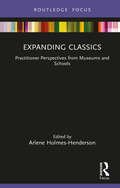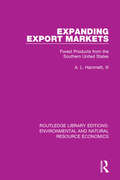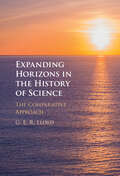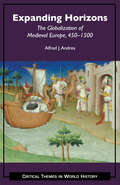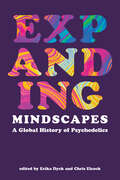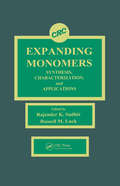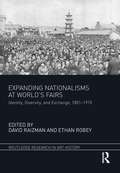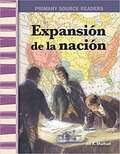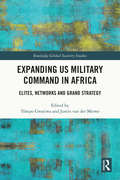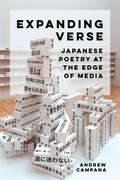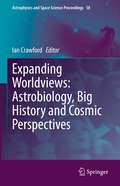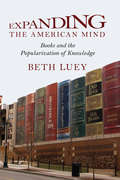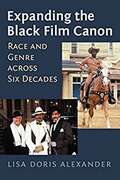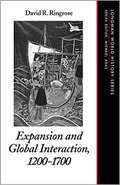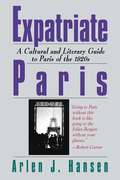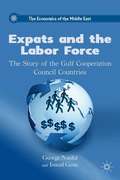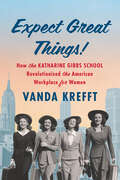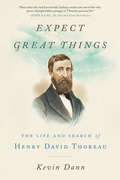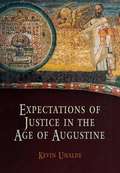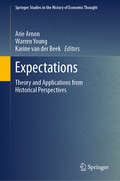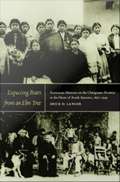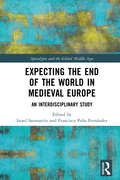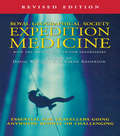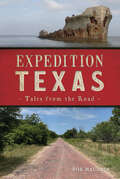- Table View
- List View
Expanding Classics: Practitioner Perspectives from Museums and Schools (Classics In and Out of the Academy)
by Arlene Holmes-HendersonThis volume explores innovative ways of expanding classical languages and cultures to educational and museum audiences. It shows that classical subjects have an important role to play within society and can enrich individuals’ lives in many different, and perhaps surprising, ways. Chapters present projects covering literacy and engagement with reading, empowering students to understand and use new types of vocabulary, discovering the personal relevance of ancient history and the resonance of ancient material culture and stories. Contributors demonstrate that classical subjects can be taught cost-effectively and inclusively by non-specialist teachers and in non-traditional settings. In their various ways, they highlight the need to rethink the role of Classics in twenty-first-century classrooms and communities. Recommendations are made for further development, including ways to improve research, policy and practice in the field of Classics education. Expanding Classics presents an important series of case studies on classical learning, of interest to museum educators, teacher trainers, school leaders and curriculum designers, as well as those teaching in primary, secondary and further education settings in the UK and worldwide.
Expanding Export Markets: Forest Products from the Southern United States (Routledge Library Editions: Environmental and Natural Resource Economics)
by A. L. HammettOriginally published in 1996. In order to increase exports and expand profits, U. S. manufacturers must be able to adapt to changing competitive pressures. This book presents methods to quantify competition and help predict profitability to help hardwood lumber manufacturers adapt to changing market conditions based on three research studies. This title will be of interest to students of environmental economics.
Expanding Horizons in the History of Science: The Comparative Approach
by G. E. LloydThis book challenges the common assumption that the predominant focus of the history of science should be the achievements of Western scientists since the so-called Scientific Revolution. The conceptual frameworks within which the members of earlier societies and of modern indigenous groups worked admittedly pose severe problems for our understanding. But rather than dismiss them on the grounds that they are incommensurable with our own and to that extent unintelligible, we should see them as offering opportunities for us to revise many of our own preconceptions. We should accept that the realities to be accounted for are multi-dimensional and that all such accounts are to some extent value-laden. In the process insights from current anthropology and the study of ancient Greece and China especially are brought to bear to suggest how the remit of the history of science can be expanded to achieve a cross-cultural perspective on the problems.
Expanding Horizons: The Globalization of Medieval Europe, 450–1500 (Critical Themes in World History)
by Alfred J. Andrea"A trailblazer in the field of premodern global history, Andrea here guides readers through the medieval expansion of the 'first Europe' from the fifth to the fifteenth centuries. Ranging from Ireland to Ethiopia, from the Mongol Empire to the so-called New World, Expanding Horizons demolishes any lingering sense that European societies remained isolated from the wider world before the modern age. Complete with maps, excerpts from primary source documents, and suggestions for further reading, this book will be an ideal resource for anyone planning to build a course around themes of global travel, exploration, and colonialism." —Brett E. Whalen, The University of North Carolina at Chapel Hill
Expanding Mindscapes: A Global History of Psychedelics
by Erika Dyck and Chris ElcockThe first collection of its kind to explore the diverse and global history of psychedelics as they appealed to several generations of researchers and thinkers.Expanding Mindscapes offers a fascinatingly fluid and diverse history of psychedelics that stretches around the globe. While much of the literature to date has focused on the history of these drugs in the United States and Canada, editors Erika Dyck and Chris Elcock deliberately move away from these places in this collection to reveal a longer and more global history of psychedelics, which chronicles their discovery, use, and cultural impact in the twentieth century.The authors in this collection explore everything from LSD psychotherapy in communist Czechoslovakia to the first applications of LSD-25 in South America to the intersection of modernism and ayahuasca in China. Along the way, they also consider how psychedelic experiments generated their own cultural expressions, where the specter of the United States may have loomed large and where colonial empires exerted influence on the local reception of psychedelics in botanical and pharmaceutical pursuits.Breaking new ground by adopting perspectives that are currently lacking in the historiography of psychedelics, this collection adds to the burgeoning field by offering important discussions on underexplored topics such as gender, agriculture, parapsychology, anarchism, and technological innovations.
Expanding Monomers: Synthesis, Characterization, and Applications
by Rajender Kumar Sadhir Mr. Russell LuckExpanding Monomers: Synthesis, Characterization, and Applications provides a thorough discussion of expanding polymer systems and their potential applications. The scope of the book includes background information on conventional monomers, their polymeric systems, and associated shrinkage problems. Monomers that expand during polymerization are covered in detail, including their synthesis and characterization. Polymerization (homopolymerization and copolymerization) of expanding monomers is discussed, in addition to mechanisms and kinetics of several polymerization processes, such as cationic initiation and free radical ring-opening polymerization. The book also explores various applications in which expanding polymer systems have potential. These applications include coatings, casting and potting materials, composite adhesives, and electrical insulations. Expanding Monomers: Synthesis, Characterization, and Applications will be valuable as a reference for manufacturers, researchers, teachers, and students in polymer and materials science, in addition to industry and university libraries.
Expanding Nationalisms at World's Fairs: Identity, Diversity, and Exchange, 1851-1915 (Routledge Research in Art History)
by David Raizman Ethan RobeyExpanding Nationalisms at World’s Fairs: Identity, Diversity, and Exchange, 1851–1915 introduces the subject of international exhibitions to art and design historians and a wider audience as a resource for understanding the broad and varied political meanings of design during a period of rapid industrialization, developing nationalism, imperialism, expanding trade and the emergence of a consumer society. Its chapters, written by both established and emerging scholars, are global in scope, and demonstrate specific networks of communication and exchange among designers, manufacturers, markets and nations on the modern world stage from the second half of the nineteenth century into the beginning of the twentieth. Within the overarching theme of nationalism and internationalism as revealed at world’s fairs, the book’s essays will engage a more complex understanding of ideas of competition and community in an age of emergent industrial capitalism, and will investigate the nuances, contradictions and marginalized voices that lie beneath the surface of unity, progress, and global expansion.
Expanding The Nation (Social Studies: Informational Text)
by Jill K. MulhallThe westward expansion of the United States included obtaining several areas of land including the Louisiana Territory, Texas, the Gadsden Purchase, and Alaska; these acquisitions changed the course of America forever.
Expanding US Military Command in Africa: Elites, Networks and Grand Strategy (Routledge Global Security Studies)
by Justin van der Merwe Tshepo GwatiwaThis book discusses the systematic expansion of the United States Africa Command (AFRICOM) across the continent of Africa. This book posits that AFRICOM expansion in Africa is part of a broader system of accumulation based on a government-business-media (GBM) complex. Applying the concept at both structural and descriptive levels, the GBM complex is a function of the synergy between the state’s quest for power, businesses’ need for expansion, and the informational and hegemonic functions of media actors. The United States’ GBM complex in Africa is supported—and in some locations spearheaded—by its military, with dispossessing effects on local actors. Drawing from African case studies, analytical accounts and empirical case studies, this book explores AFRICOM’s role within this broader strategy. The volume maps both the methods and the scope of this expansion, as well as local resistance to this process, and comprises perspectives from the five regions of Africa, key sub-regional organizations and voices from Africa’s regional hegemons. This book will be of much interest to students of security studies, strategic studies, African politics and International Relations.
Expanding Verse: Japanese Poetry at the Edge of Media (New Interventions in Japanese Studies #6)
by Andrew CampanaA free ebook version of this title is available through Luminos, University of California Press's Open Access publishing program. Visit www.luminosoa.org to learn more.Expanding Verse explores experimental poetic practice at key moments of transition in Japan's media landscape from the 1920s to the present. Andrew Campana centers hybrid poetic forms in modern and contemporary Japan—many of which have never been examined in detail before—including the cinepoem, the tape recorder poem, the protest performance poem, the music video poem, the online sign language poem, and the augmented reality poem. Drawing together approaches from literary, media, and disability studies, he contends that poetry actively aimed to disrupt the norms of media in each era. For the poets in Expanding Verse, poetry was not a medium in and of itself but a way to push back against what new media technologies crystallized and perpetuated. Their aim was to challenge dominant conceptions of embodiment and sensation, as well as who counts as a poet and what counts as poetry. Over and over, poetic practice became a way to think about each medium otherwise, and to find new possibilities at the edge of media.
Expanding Worldviews: Astrobiology, Big History and Cosmic Perspectives (Astrophysics and Space Science Proceedings #58)
by Ian CrawfordThis book collates papers presented at two international conferences (held at the Australian National University in 2018 and Birkbeck College London in 2019) exploring the relationships between big history and astrobiology and their wider implications for society. These two relatively new academic disciplines aim to integrate human history with the wider history of the universe and the search for life elsewhere. The book will show that, despite differences in emphasis, big history and astrobiology share much in common, especially their interdisciplinary approaches and the cosmic and evolutionary perspectives that they both engender.Specifically, the book addresses the unified, all-embracing, nature of knowledge, the impact of big history on humanity and the world at large, the possible impact of SETI on astrobiology and big history, the cultural signature of Earth’s inhabitants beyond our own planet, and the political implications of a planetary worldview. The principal readership is envisaged to comprise scholars working in the fields of astrobiology, big history and space exploration interested in forging interdisciplinary links between these diverse topics, together with educators, and a wider public, interested in the societal implications of the cosmic and evolutionary perspectives engendered by research in these fields.
Expanding the American Mind: Books and the Popularization of Knowledge
by Beth LueyOver the past fifty years, knowledge of the natural world, history, and human behavior has expanded dramatically. What has been learned in the academy has become part of political discourse, sermons, and everyday conversation. The dominant medium for transferring knowledge from universities to the public is popularization--books of serious nonfiction that make complex ideas and information accessible to nonexperts. Such writers as Carl Sagan, Stephen Jay Gould, Stephen Hawking, Daniel Boorstin, and Robert Coles have attracted hundreds of thousands of readers. As fields such as biology, physics, history, and psychology have changed the ways we view ourselves and our place in the universe, popularization has played an essential role in helping us to understand our world. Expanding the American Mind begins by comparing fiction and nonfiction--their relative respectability in the eyes of reading experts and in the opinions of readers themselves. It then traces the roots of popularization from the Middle Ages to the present, examining changes in literacy, education, and university politics. Focusing on the period since World War II, it examines the ways that curricular reform has increased interest in popularization as well as the impact of specialization and professionalization among the faculty. It looks at the motivations of academic authors and the risks and rewards that come from writing for a popular audience. It also explains how experts write for nonexperts--the rhetorical devices they use and the voices in which they communicate. Beth Luey also looks at the readers of popularizations--their motivations for reading, the ways they evaluate nonfiction, and how they choose what to read. This is the first book to use surveys and online reader responses to study nonfiction reading. It also compares the experience of reading serious nonfiction with that of reading other genres. Using publishers' archives and editor-author correspondence, Luey goes on to examine what editors, designers, and marketers in this very competitive business do to create and sell popularizations to the largest audience possible. In a brief afterword she discusses popularization and the Web. The result is a highly readable and engaging survey of this distinctive genre of writing.
Expanding the Black Film Canon: Race and Genre Across Six Decades
by Lisa Doris AlexanderIf the sheer diversity of recent hits from Twelve Years a Slave and Moonlight to Get Out, Black Panther, and BlackkKlansman tells us anything, it might be that there’s no such thing as “black film” per se. This book is especially timely, then, in expanding our idea of what black films are and, going back to the 1960s, showing us new and interesting ways to understand them. <p><p> When critics and scholars write about films from the Blaxploitation movement—such as Cotton Comes to Harlem, Shaft, Superfly, and Cleopatra Jones—they emphasize their importance as films made for black audiences. Consequently, Lisa Doris Alexander points out, a film like the highly popular, Oscar-nominated Blazing Saddles—costarring and co-written by Richard Pryor—is generally left out of the discussion because it doesn’t fit the profile of what a black film of the period should be. This is the kind of categorical thinking that Alexander seeks to broaden, looking at films from the 60s to the present day in the context of their time. Applying insights from black feminist thought and critical race theory to one film per decade, she analyzes what each can tell us about the status of black people and race relations in the United States at the time of its release. <p><p> By teasing out the importance of certain films excluded from the black film canon, Alexander hopes to expand that canon to include films typically relegated to the category of popular entertainment—and to show how these offer more nuanced representations of black characters even as they confront, negate, or parody the controlling images that have defined black filmic characters for decades.
Expanding the Palace of Torah: Orthodoxy and Feminism
by Tamar Ross"Expanding the Palace of Torah offers a broad philosophical overview of the challenges the women's revolution poses to Orthodox Judaism, and Orthodox Judiasm's response to those challenges. Writing as an insider (herself an Orthodox Jew), Ross seeks to develop a theological response that fully acknowledges the male bias of Judaism's sanctified texts, yet nevertheless provides a rational for transforming that bias in today's world without undermining their authority. She proposes an approach to divine revelation-- the theological heart of traditional Judaism-- which she calls "cumulativism." This approach is based on a conflating of strict boundaries between text and its interpretation, or the divine intent and the evolution of human understanding." "Ross believes that the greater fluidity afforded by cumulativism is necessary for legitimizing the insights of feminism and fully absorbing women's changed status within the religious rubric of Jewish tradition. Emphasizing that continuity with tradition can be maintained only when the halakhic system is understood as a living organism that grows via affirmation of its historical legacy and respect for its constraints, her book shows that the feminist revolution in Orthodox Judaism reaches beyond its practical effect upon individual lives to teach us something more profound about the nature of religious practice in general." -- Amy Gottlieb Zorn berg (from the back cover)
Expansion And Global Interaction: 1200-1700
by David R. RingroseA new entry in the Longman World History Series, this volume is a perfect supplement to a World History or Western Civilization course as well as introductory courses on Asia, Africa, or Latin America. Each book in the Longman World History Series, edited by Michael Adas, focuses on a prominent theme, process, or pattern in global history, and treats the topic in a cross-cultural and comparative manner. In Expansion and Global Interaction: 1200-1700, David Ringrose, an established historian of Spain and the Spanish empire, explores the dynamism that arose everywhere in the world after 1200 and shows how a series of autonomous societies became interdependent on a global scale by 1700. By examining the five major arenas of conflict, ranging from Imperial China to the Aztec and Inca Empires, he illustrates how political, cultural, and economic zones of influence expanded and overlapped. The author concludes with the observation that, by 1700, Europeans were influential across the globe, but were not yet dominant in more than a few areas and, as of 1700, their power in the nineteenth century would have been hard to predict.
Expatriate Paris: A Cultural and Literary Guide to Paris of the 1920s
by Arlen J. HansenParis has long been a storied center of art and culture, and of romance, but in the 1920s its magnetism was especially irresistible. From around the world writers, artists, and composers steamed in, to visit or linger, some to reside. For travelers, Francophiles and the curious, this gossipy retrospective of expatriate life in Paris in the 1920s is a mosaic of quick glimpses--Sarah Bernhardt sleeping in a coffin to overcome her fear of death, Igor Stravinsky diving through a huge wreath at the premiere of his ballet Les Noces, Ford Madox Ford meeting Ernest Hemingway, Langston Hughes near starvation, Josephine Baker establishing her nightclub. The list of expatriates is long and luminous, and this book--a work of immense erudition spiced with anecdotes and gossip--documents their haunts and habits, their comings and goings, their relationships intimate and artistic. Structured in thirty-three geographical and very walkable sections, Expatriate Paris is cross-referenced by streets, names, and topics and equipped with nine maps to satisfy the most demanding traveler, whether real or armchair.
Expats and The Labor Force
by George Naufal Ismail GencExpats and the Labor Force examines the flows of people and money in the Gulf Cooperation Council (GCC) countries. This timely book outlines the reasons that made the Gulf region a destination for millions of migrants. Taking advantage of the discovery of large hydrocarbon reserves and relatively stable political environment, the GCC countries filled the large demand for labor with foreign workers. However the number, share, and source of expatriates have presented serious challenges for the region. Naufal and Genc discuss these consequences on the composition of the labor force and remittance outflows.
Expect Great Things!: How the Katharine Gibbs School Revolutionized the American Workplace for Women
by Vanda KrefftA fun and fascinating social history of the famed Katharine Gibbs School, which from the 1910s to the 1960s, trained women for executive secretary positions but surreptitiously was instilling the self-confidence and strategic know-how necessary for them to claim equality, power, and authority in the wider world. It&’s a safe bet that most of the secretaries on the TV series Mad Men would have attended the Katharine Gibbs School in New York City. The iconic institution was in its heyday in the 1950 and '60s synonymous with supplying secretaries—always properly attired in heels, ladylike hats, and white gloves—to male executives. In Expect Great Things! Vanda Krefft turns the notion of a &“Gibbs girl&” on its head, showing us that while the school was getting women who could type 90 words per minute into the C-suite, its more subversive mission was to get them out of the secretarial pool to assume positions of power on the other side of the desk. And Gibbs graduates did just that, tackling the sexism of the era and paving the way for 21st-century women to succeed in any profession. Katharine Gibbs was one her own success stories. She started her school when, as a 46-year-old widow, she was left near-broke with two young sons. The school taught typing and stenography but Gibbs also hired accomplished professors from elite colleges to teach academic subjects—it was a well-rounded education that produced early feminists ready to tackle the sexism of their era. "Expect great things!" was her motto and her philosophy. Within a decade she&’d opened schools in three elegant locations. With nostalgic period photographs throughout, Expect Great Things! takes us back to Katie Gibbs&’s life and tells the stories of the women she influenced. We meet Gibbs graduates who worked for the Walt Disney, Marilyn Monroe, and Robert F. Kennedy. Others forged pathfinding roles as an Emmy-winning television star, a women&’s rights advisor to four U.S. presidents, a writer of Wonder Woman comic books, the head of the Women&’s Marines, a best-selling young adult author, and a U.S. Ambassador. For readers of The Barbizon and Come Fly the World, Expect Great Things! reveals the seismic impact the Katharine Gibbs school had on the American workplace—and on women&’s opportunities today.
Expect Great Things: The Life and Search of Henry David Thoreau
by Kevin DannTo coincide with the bicentennial of Thoreau's birth in 2017, this thrilling, meticulous biography by naturalist and historian Kevin Dann fills a gap in our understanding of one modern history's most important spiritual visionaries by capturing the full arc of Thoreau's life as a mystic, spiritual seeker, and explorer in transcendental realms.This sweeping, epic biography of Henry David Thoreau sees Thoreau's world as the mystic himself saw it: filled with wonder and mystery; Native American myths and lore; wood sylphs, nature spirits, and fairies; battles between good and evil; and heroic struggles to live as a natural being in an increasingly synthetic world. Above all, Expect Great Things critically and authoritatively captures Thoreau's simultaneously wild and intellectually keen sense of the mystical, mythical, and supernatural. Other historians have skipped past or undervalued these aspects of Thoreau's life. In this groundbreaking work, historian and naturalist Kevin Dann restores Thoreau's esoteric visions and explorations to their rightful place as keystones of the man himself.
Expectations of Justice in the Age of Augustine
by Kevin UhaldeAugustine, bishop of Hippo between 395 and 430, and his fellow bishops lived and worked through massive shifts in politics, society, and religion. Christian bishops were frequently asked to serve as intellectuals, legislators, judges, and pastors--roles and responsibilities that often conflicted with one another and made it difficult for bishops to be effective leaders. Expectations of Justice in the Age of Augustine examines these roles and the ways bishops struggled to fulfill (or failed to fulfill) them, as well as the philosophical conclusions they drew from their experience in everyday affairs, such as oath-swearing, and in the administration of penance.Augustine and his near contemporaries were no more or less successful at handling the administration of justice than other late antique or early medieval officials. When bishops served in judicial capacities, they experienced firsthand the complex inner workings of legal procedures and social conflicts, as well as the fallibility of human communities. Bishops represented divine justice while simultaneously engaging in and even presiding over the sorts of activities that animated society--business deals, litigations, gossip, and violence--but also made justice hard to come by.Kevin Uhalde argues that serving as judges, even informally, compelled bishops to question whether anyone could be guaranteed justice on earth, even from the leaders of the Christian church. As a result, their ideals of divine justice fundamentally changed in order to accommodate the unpleasant reality of worldly justice and its failings. This philosophical shift resonated in Christian thought and life for centuries afterward and directly affected religious life, from the performance of penance to the way people conceived of the Final Judgment.
Expectations: Theory and Applications from Historical Perspectives (Springer Studies in the History of Economic Thought #Vol. 65)
by Arie Arnon Warren Young Karine van der BeekThis book provides a unique historical perspective on expectations in economic theory, and applications of expectations models in economic history. Based on papers presented at the 2017 Thomas Guggenheim Conference, it brings together the work of economists, historians of economics, and economic historians on issues and events concerning expectations in economics and economic history. The contributions address: (i) the history of expectations models; (ii) growth, expectations and political economy; (iii) controversies regarding expectations methods and models; (iv) expectations in theory and reality; and (v) expectations in economic history. The book opens with a lecture by Thomas Guggenheim Prize winner Duncan Foley on the evolution of expectations in modern economic thought. The remaining content is divided into two parts, the first of which focuses on the utilization of expectations in the “ancient” and “meso” periods of high theory, i.e., from Smithian to Keynesian approaches. The papers cover topics such as “modern” applications of expectations in both “Tobinesque-Phillips” and “Harrodian-Solowian” contexts, and the debate between Friedmanite and Keynesian approaches to expectation formation. In turn, the last part presents essays on the role of economic expectations in connection with historical events and contexts, ranging from the early 20th century to World War II, and on the application of expectations theory to hyperinflation and stabilization, taking Israel as a case study.
Expecting Pears from an Elm Tree: Franciscan Missions on the Chiriguano Frontier in the Heart of South America, 1830-1949
by Erick D. LangerMissions played a vital role in frontier development in Latin America throughout the nineteenth and twentieth centuries. They were key to the penetration of national societies into the regions and indigenous lands that the nascent republics claimed as their jurisdictions. In Expecting Pears from an Elm Tree, Erick D. Langer examines one of the most important Catholic mission systems in republican-era Latin America, the Franciscan missions among the Chiriguano Indians in southeastern Bolivia. Using that mission system as a model for understanding the relationship between indigenous peoples and missionaries in the post-independence period, Langer explains how the missions changed over their lifespan and how power shifted between indigenous leaders and the missionaries in an ongoing process of negotiation. Expecting Pears from an Elm Tree is based on twenty years of research, including visits to the sites of nearly every mission discussed and interviews with descendants of mission Indians, Indian chiefs, Franciscan friars, mestizo settlers, and teachers. Langer chronicles how, beginning in the 1840s, the establishment of missions fundamentally changed the relationship between the Chiriguano villages and national society. He looks at the Franciscan missionaries' motives, their visions of ideal missions, and the realities they faced. He also examines mission life from the Chiriguano point of view, considering their reasons for joining missions and their resistance to conversion, as well as the interrelated issues of Indian acculturation and the development of the mission economy, particularly in light of the relatively high rates of Indian mortality and outmigration. Expanding his focus, Langer delves into the complex interplay of Indians, missionaries, frontier society, and the national government until the last remaining missions were secularized in 1949. He concludes with a comparative analysis between colonial and republican-era missions throughout Latin America.
Expecting the End of the World in Medieval Europe: An Interdisciplinary Study (Apocalypse and the Global Middle Ages)
by Israel Sanmartín Francisco Peña FernándezExpecting the End of the World in Medieval Europe: An Interdisciplinary Study examines the phenomenon of medieval eschatology from a global perspective, both geographically and intellectually. The collected contributions analyze texts, authors, social movements, and cultural representations covering a wide period, from the 6th to the 16th century, in geographically liminal spaces where Catholic, Byzantine, Islamic, and Jewish cultures converged.The book is organized in eleven chapters which reflect and explore the following arguments: the study of specific eschatological episodes in medieval Europe and their interpretations; the analysis of apocalyptic visionaries, apocalyptic authors, and their individual contributions; the social and political implications of eschatology in medieval society; the study of medieval apocalyptic literature from a rhetorical, narratological, and historiographical perspective; the history of the transmission of apocalyptic literature and its transformation over time; and a comparative examination of apocalypticism between the Middle Ages and the Early Modern era.This study provides a lens through which academics, specialists, and interested researchers can observe and reflect on this entire eschatological universe, dwelling both on well-known texts, authors, and events, and on others which are much less popular. In gathering different paradigms, tools, and theoretical frameworks, the book exposes readers to the complex reality of medieval anxiety regarding the end of the world.
Expedition Medicine: Revised Edition (Oxford Medical Handbooks Ser.)
by Sarah Anderson David WarrellThis is a completely rewritten and revised second edition of the now standard text, prepared under the auspices of the Royal Geographical Society of Great Britain. Comprehensively updated to take into account new research findings and medicines, and adapted for the American explorer, Expedition Medicine is written by renowned experts in their fields and provides a wealth of practical tips and advice, as well as extensive details about first aid kits, emergency procedures, and evacuation routines. Coverage includes sections on every kind of travel from desert to mountain, canoeing to diving, and off-road driving to walking, with valuable information on vaccinations, medicines, and hygiene.
Expedition Texas: Tales from the Road (The\history Press Ser.)
by Bob MauldinIf the weathered landmarks and forgotten trails of the Lone Star State could talk, this is what they might say.The TV show Expedition Texas brings to life stories of abandoned buildings, ghost towns and other lost Texas history locations. Hit the road with Bob Mauldin and his crew and hear the stories behind the stories. Venture deep beneath the surface to explore a missile launch site. Climb crumbling stairs high above the ground to the top of amazing historical hotels. There's lost history all over Texas. And, on Expedition Texas, we're gonna find it.
